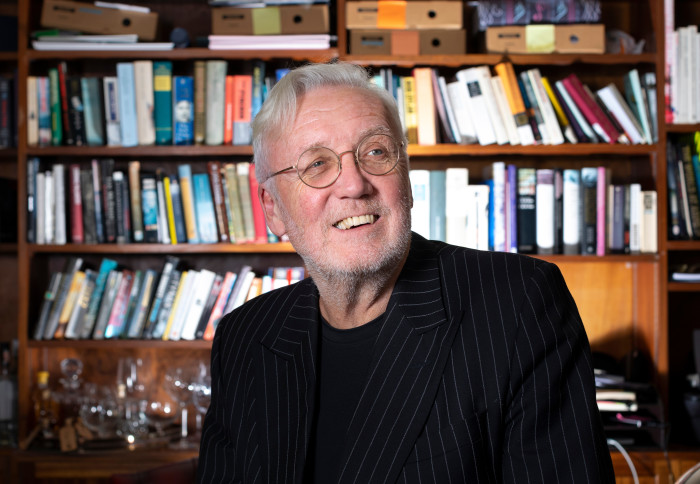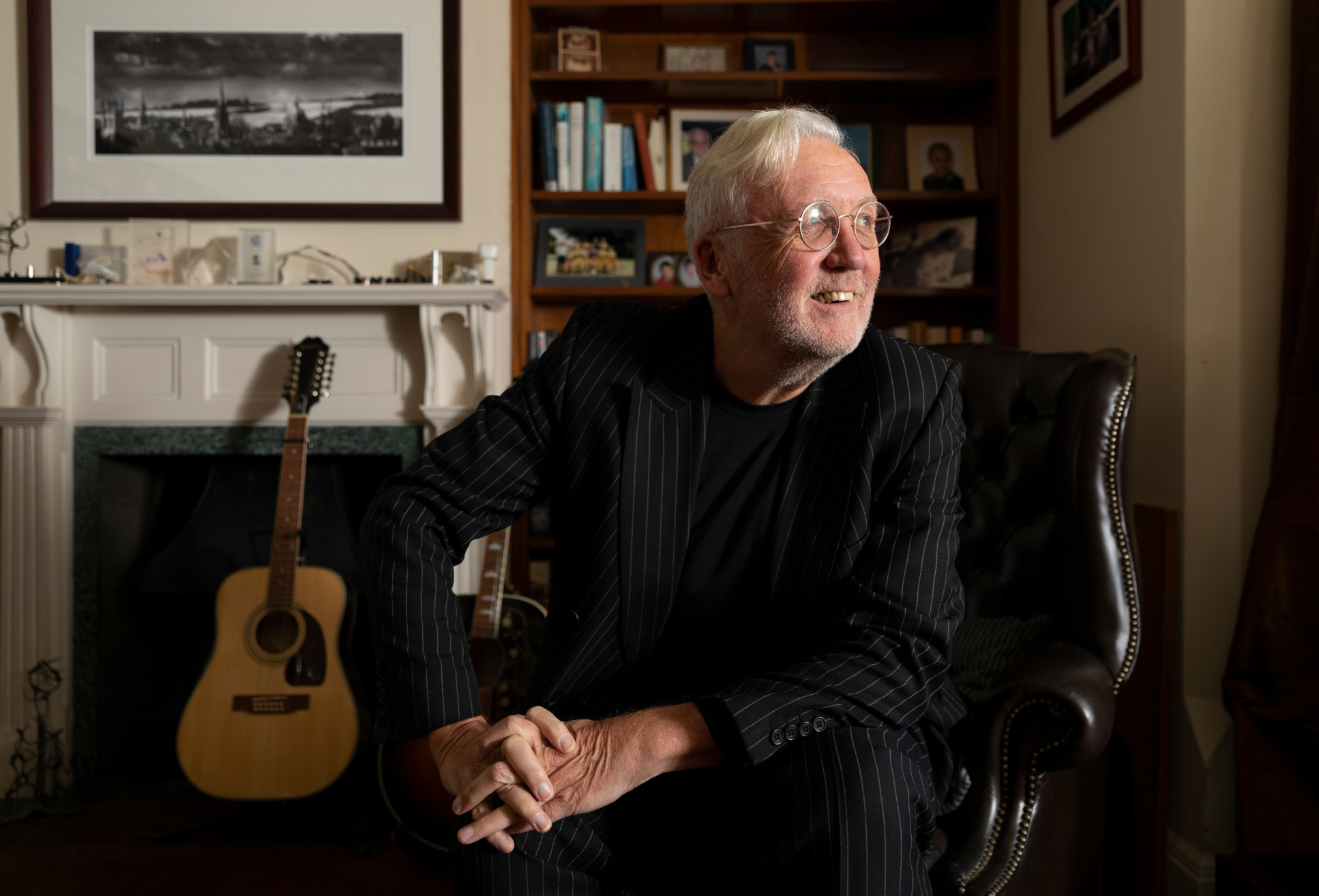In memory of Dr Paul Atherton
by Jenn Rowater

Entrepreneur and mentor Dr Paul Atherton (PhD Physics 1978) has died following a short illness at the age of 69.
Paul’s dedication to entrepreneurship and innovation set an outstanding example to the UK startup ecosystem and beyond for over 30 years. He shared his expertise and insight generously as an investor and long-time supporter of a number of illustrious universities, including Imperial, where he supported teaching, research and entrepreneurship.
In 2021, Paul became joint winner of Imperial’s inaugural Alumni Entrepreneur Award in recognition of his career as a serial entrepreneur and his contribution to the culture of enterprise at the College as the Founding Director of Imperial Venture Mentoring Service.
In this pivotal role, he guided the next generation of Imperial entrepreneurs, supporting and investing in world-changing ideas and technology, with a smile and a twinkle in his eye.
Victoria Nicholl, Head of Incubation Services in the Enterprise team at the College, paid tribute to Paul's contribution to life at Imperial:
“Paul was such an exciting person to work with. He relished the challenges that arose from creating a world-class entrepreneurial mentoring service, delighted in the success of Imperial’s entrepreneurs, and hugely enjoyed meeting and working with other mentors. He was generous with his time, insight and connections. A conversation with Paul always somehow managed to be a laugh and a masterclass in strategic thinking, with kindness and good business sense at its core.”
An accidental entrepreneur
Paul described his entrepreneurial career as an accident. He co-founded his first company, Queensgate Instruments, while studying Physics at Imperial in 1978. Paul and his co-founders developed technology that enabled them to study the night sky more effectively, taking just hours to do things that would previously have taken days. The technology was popular and the team spent their Saturdays building the instruments for academics from prestigious research groups. They decided to turn it into a company, Queensgate Instruments.
Paul planned on pursuing an academic career, but that changed when he took a call from NASA, who wanted to use the Queensgate technology on a space shuttle. Paul initially took a year’s sabbatical to focus on the business, before deciding his path lay with the company rather than academia. He studied for an MBA at London Business School and was Managing Director of Queensgate Instruments from 1987 until the company was sold in 2000 for more than $200 million.

Paul went on to found, develop and support numerous other companies and institutions with leadership roles including: Chairman of C2V (Micro Gas Chromatographs); founder and Chairman of Midaz Lasers; an Angel Investor in Natural Motion; Chair of Sussex Place Ventures, the London Business School Venture Fund; founder and Executive Chairman of Nexeon Limited (lithium ion battery materials for energy storage); and Chair of Phase Focus Ltd.
Paul was Non-Executive Director of Imperial Innovations from 2004 to 2014, helping to raise several hundred million pounds for investment in UK technology startups. His most recent investment was in the startup FungiAlert, now known as FA Bio, an Imperial spinout focusing on analysing the soil microbiome for sustainable farming based on the work of PhD students.
In driving the growth and scale of various startup and spinout businesses, Paul directly influenced the creation of 300+ jobs, raised over £130 million in venture funding, and engineered four exits at a combined valuation in excess of $800 million.
Giving back
Paul used his experience to support the culture of entrepreneurship at the College, fostering the next generation of Imperial entrepreneurs. In 2017, Paul became the Founding Director of Imperial College London’s flagship Venture Mentoring Service (IVMS). Under Paul’s leadership, IVMS has attracted 98 serial entrepreneurs and industry experts to take on volunteer mentor roles, helping over 130 ventures, who have raised more than £70 million in funding. Participating ventures have moved on to prestigious accelerators to further fuel their impact.
Dominique Kleyn (Botany and Plant Technology 1983, MBA 2005), Director of IVMS and Co-Founder of Orthonika, paid tribute to Paul:
“IVMS owes much to Paul’s vision and leadership. His long experience of the work of Imperial and superb understanding of technology commercialisation has given us a firm foundation for future success in our role as venture mentors for staff and students. Paul’s enthusiasm and warm personality made a great impression on those who were lucky enough to cross his path and he will be sadly missed.”
Ben Mumby-Croft, Director of Entrepreneurship at Imperial, also worked closely with Paul:
“Paul was a tireless advocate for unconflicted, team-based mentoring for founders across College. Whilst we are all devastated by the news, Paul’s spirit lives on in the entrepreneurial culture and networks he helped to establish at Imperial. High standards yes, but always delivered with generosity, respect and kindness of spirit, not to mention a mischievous twinkle in the eye and that smile! Paul inspired me and will continue to be a north star guiding how we help, support, and encourage entrepreneurship across college.”

The impact of the programme can really be seen through the testimonials of both mentors and mentees.
Speaking about IVMS, Stella Hartley, mentor of multiple startups with the programme, said: “It’s great to be involved with bright young people who are making the world a better place. IVMS offers startups an invaluable support network and a shortcut to business wisdom that would take years to accumulate.” Pelation, mentored by Stella, agree: “Our mentors have been absolutely fantastic, they have given us invaluable advice...and really challenged us into thinking about our business strategically.”
Iain Hunter, mentor to six startups through IVMS, says: “It's a privilege to be immersed in the fabric of Imperial and to have first-hand exposure to the extraordinary breadth of talent and innovation so evident in the wide range of budding enterprises that the Enterprise Lab and IVMS fosters. The most valuable part of being an IVMS mentor is being able to make a difference.”
This idea of making a difference ran strongly through Paul’s portfolio of activity and he believed entrepreneurship wasn’t about making money, but about making the world a better place: “Those are the things that excite me, when people want to help solve issues like climate change or cancer.”
In Paul’s own words, “If I was an academic researcher, I’d be building technology to go on satellites. That would make the world better in a different way. But the startups I have founded are helping with things like climate change (Nexeon), cancer (Phase Focus), feeding the world sustainably (FA Bio) and improving mental health (Delica). That’s what drives me.
“For me, life is about leaving the world a better place for my children and grandchildren and everyone in it. If I can do that through my activities, that would be wonderful.”

Article text (excluding photos or graphics) © Imperial College London.
Photos and graphics subject to third party copyright used with permission or © Imperial College London.
Reporter
Jenn Rowater
Advancement